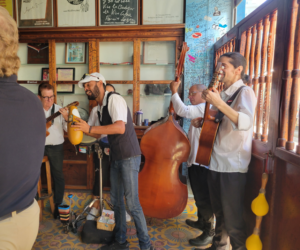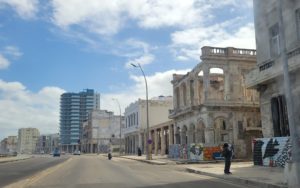Cuba Through the Lens of Post-Modernism
We arrived in Old Havana on a Saturday evening, only to find the city gripped by a nationwide power outage that had begun the previous day.
The streets—full of rubble and trash, as always—were (we were told) unusually quiet, with none of the regular bustling activity you would expect in a city on a Saturday evening.
Most restaurants, bars, and stores were closed. Yet, pockets of resilience were evident: we discovered a bar operating thanks to a loud generator, where a live band played Cuban music, drawing a crowd that danced to the beat, sang enthusiastically, drank mojitos, and momentarily escaped the frustrations of the blackout. This crowded little bar, spilling out into the street, was a bright spot in a blighted city.
A few blocks further on, we saw several extension cords coming out of a doorway and nearby windows, with many people crowded around waiting while they charged their electric devices. This place was either running a generator or was—temporarily—a lone spot of electric power in an otherwise powerless city. Such acts of resilience can be seen as local narratives of survival in the face of a failing grand narrative of state support.
These glimpses into Havana’s contradictions set the stage for a journey into a society where postmodern themes of resilience, adaptation, and disillusionment are palpable.
Defining Postmodernism
To understand the complexities of contemporary Cuban society, it’s helpful to consider the lens of postmodernism. In his book Explaining Postmodernism; Skepticism and Socialism from Rousseau to Foucault, Stephen R.C. Hicks, explains that modernism was founded on the philosophy of the Enlightenment and post-modernism essentially stands in opposition to modernism. As Hicks states,
Postmodernism’s essentials are the opposite of modernism’s. Instead of natural reality—anti-realism. Instead of experience and reason—linguistic social subjectivism. Instead of individual identity and autonomy—various race, sex, and class groupisms. Instead of human interests as fundamentally harmonious and tending toward mutually-beneficial interaction—conflict and oppression. Instead of valuing individualism in values, markets, and politics—calls for communalism, solidarity, and egalitarian restraints. Instead of prizing the achievements of science and technology—suspicion tending toward outright hostility. [1]
This opposition manifests in several key ways. First, postmodernism challenges the modernist belief in objective truth, replacing it with “anti-realism” or constructed truth. Where modernism posits that there is a natural reality that can be understood through reason and observation, postmodernism questions the very existence of an objective reality, suggesting instead that reality is socially constructed.
Second, postmodernism shifts the focus from individualism to group identity. While modernism emphasizes individual autonomy and self-determination, postmodernism highlights the influence of social categories like race, sex, and class in shaping individual experiences and perspectives.
Finally, postmodernism critiques the modernist emphasis on reason, instead prioritizing “linguistic social subjectivism.” Postmodern thinkers argue that language and social context play a crucial role in shaping our understanding of the world, rather than universal reason.
Hicks emphasizes the radical nature of this shift. He notes, “Once reason is in principle severed from reality, one then enters a different philosophical universe altogether. And you have an entirely new set of values, rules, ideas, and so on.” [2]
In the Cuban context, these postmodern themes become relevant when considering the disillusionment that arises from the gap between the revolution’s promises and the people’s lived realities. [If a “nutshell” version of Cuba’s history would be helpful to understand some of this, please see the end of this article.]
State-owned vs. Private Businesses
Postmodernism’s influence can be observed in various facets of Cuban society, presenting both challenges and opportunities for leadership. For example, up until two years ago, the government permitted people to be self-employed but not to own their own businesses. Almost everything was under centralized control of the state.
When that changed, and innovative and enterprising Cubans could own their own businesses, it began an economic transformation. Now, 15% of the GDP comes from these private businesses. [3]
This has led to a clear difference in economic realities and service standards, with private businesses often offering better resources and service than state-run enterprises.
For instance, when you visit a state-run restaurant you never know if you’ll be able to get staples like coffee or a Coke. At a private business, the resources are almost always much better. Why? Because most of them are funded by relatives in America. After all, you need capital to start a business.
Cubans have a lot to learn about service, but they are indeed learning. As we experienced multiple times during our visit, some at a private business (like hotels and restaurants) are hard-working and provide excellent service. Others still have the mentality of the state-run businesses. The social contract with the government is this: You’ll get your paycheck if you show up and pretend to work. Owners and workers at private businesses have more incentive to improve customer service.
This disparity reflects a postmodern fragmentation of economic experience, where different groups operate under different sets of rules and expectations. It also illustrates a shift away from the grand narrative of a unified socialist economy toward multiple economic narratives.
Cubans demonstrate resilience and adaptation, ingenuity and community spirit in the face of their daily hardships. The fuel shortage, for example, creates significant challenges for workers. One of my taxi drivers, let’s call him Jose, proudly told me he’d filled up the tank the night before. I asked him if that meant he didn’t work when he runs out of gas and he said yes, sometimes for two or three days. That’s devastating to individuals. They may be eager to work, but simply not have the resources.
So Many Contradictions…
Cuba is full of contradictions. For example, the beauty of the country exists alongside the decay. On the one hand is the crumbling infrastructure—both visible and virtual. On the other hand, we visited a beautiful white sand beach with exquisite, turquoise-colored water and pelicans diving for fish. The stark contrast between the country’s natural beauty and its decaying infrastructure reflects a postmodern sense of fragmentation and the breakdown of unifying narratives.
The failing healthcare system adds another layer of complexity, challenging the grand narrative of the revolution’s achievements. The Cuban government has always been praised for its free healthcare. But the medical system is failing because the embargo prevents them from getting medicines and medical supplies.
The iconic old-time cars from the mid-twentieth century are both an anachronism and a sign of great ingenuity and creativity. How the Cubans manage to piece together random parts to keep those cars running is a real marvel! (They are often called “Frankenstein cars” for that reason.)
There is also a generational contrast. Different generations in Cuba hold varying perspectives and experiences, shaping their understanding of the past, present, and future. Older Cubans have lived through the revolution and while some may still believe in its promises, others have come to recognize the failure of communism. Younger Cubans, on the other hand, have grown up primarily experiencing hardship and scarcity.
The desire for a different future is evident, as seen in the aspirations of individuals like my other taxi driver, Juan, who dreams of going to New York; yet he is resigned to the fact that he never will. These conversations highlighted for me the tension between local realities and global desires.
This generational divide is significant because it impacts how people perceive the current realities and envision the future of their country. While older generations may have experienced a more modernist Cuba in the early years of the revolution, younger Cubans are growing up in a society increasingly influenced by postmodern realities, marked by economic struggles, limited opportunities, and a sense of disillusionment. The result is a clash between the grand narrative of the revolution and the lived narratives of younger Cubans.
Conclusion: A Call to Engaged Compassion
Cuba’s complexities, viewed through a postmodern lens, reveal a society navigating the tension between grand narratives and lived realities. Hicks’s analysis of postmodernism helps us understand the disillusionment arising from the gap between the revolution’s promises and the people’s daily struggles. The emphasis on competing narratives, the fragmentation of economic experiences, and the resilience of the Cuban people in the face of hardship all reflect key postmodern themes.
In this context, Christian leadership can play a vital role. We visited with leaders of two different Christian organizations and found that they are actively involved in addressing the needs of the most vulnerable, providing material support, and fostering community.
One Christian leader to whom we spoke shared about their work with the elderly, children, and other vulnerable groups. Another Christian leader described their efforts to support the local community, including disaster relief, building homes, and providing food and medical supplies. These actions exemplify Christian values of compassion and service.
However, Christian leaders, and really, all leaders, must also engage with the deeper issues at play. In a postmodern context where truth is often contested and narratives clash, leaders are called to:
- Embrace humility: Acknowledge the limitations of any single perspective and be open to dialogue and learning.
- Prioritize compassion: Focus on the needs of the marginalized and vulnerable, as demonstrated by the work of the leaders we were privileged to meet.
- Foster community: Create spaces for dialogue, reconciliation, and the building of shared understanding.
- Speak truth to power: While navigating complex political realities, find ways to advocate for justice and human dignity.
The Cuban experience serves as a reminder of the importance of engaged compassion and the need for leaders to navigate the complexities of a postmodern world with wisdom, humility, and a commitment to serving others.
======
Here’s a “nutshell” version of Cuba’s history:
- Early 20th Century: Cuba gains independence from Spain in 1902, but the United States exerts significant influence, particularly through the Platt Amendment. (“Approved on May 22, 1903, the Platt Amendment was a treaty between the U.S. and Cuba that attempted to protect Cuba’s independence from foreign intervention. It permitted extensive U.S. involvement in Cuban international and domestic affairs for the enforcement of Cuban independence.”) [4]
- Mid-20th Century: Cuba experiences political instability and the rise of authoritarian leaders.
- 1959: Fidel Castro leads a revolution that overthrows Fulgencio Batista’s brutal regime, establishing a communist state.
- 1960s: The Cuban government nationalizes industries and strengthens ties with the Soviet Union. The United States imposes a trade embargo on Cuba, which continues to this day.
- Cold War Era: Cuba becomes a key player in the Cold War, supporting communist movements in other countries.
- 1990s: The collapse of the Soviet Union causes a severe economic crisis in Cuba, known as the “Special Period.”
- 21st Century: Fidel Castro eventually hands over power to his brother Raul Castro.
- Late 20th and early 21st Century: The US maintains its embargo, but there are fluctuations in the enforcement and engagement policies.
- Obama Era: The Obama administration initiates a period of rapprochement with Cuba, easing some restrictions and re-establishing diplomatic relations.
- Trump Era: The Trump administration reverses many of Obama’s policies, increasing restrictions and tightening the embargo again.
- This back-and-forth in US policy creates instability and challenges for Cubans, hindering economic development and infrastructure improvements due to limited trade and investment. The embargo’s restrictions have a deleterious effect on the Cuban people, limiting their economic opportunities and hindering the country’s ability to modernize its infrastructure, including roads, buildings, and the electrical grid.
- Cuba continues to navigate these challenges while maintaining its communist system.
1 – Stephen R.C. Hicks, Explaining Postmodernism; Skepticism and Socialism from Rousseau to Foucault, Expanded Edition (China: Ockham’s Razor Publishing, 2011), 14.
2 – Hicks, 40.
3 – Isabel Brilhante Pedrosa, EU Ambassador. Personal conversation, March 19, 2025.
4 – “Platt Amendment”, National Archives. Accessed March 22, 2025. https://www.archives.gov/milestone-documents/platt-amendment
15 responses to “Cuba Through the Lens of Post-Modernism”
Leave a Reply
You must be logged in to post a comment.





Debbie,
Focusing on this comment of yours “Cubans have a lot to learn about service, but they are indeed learning. As we experienced multiple times during our visit, some at a private business (like hotels and restaurants) are hard-working and provide excellent service. Others still have the mentality of the state-run businesses. The social contract with the government is this: You’ll get your paycheck if you show up and pretend to work. Owners and workers at private businesses have more incentive to improve customer service.”
A saying I often heard my dad, a state employee, say growing up is “That’s good enough for government work.” He often said it in jest. But reading your post, this brought some questions to my mind about our country.
Are there benefits to privatization of current government offices?
Have some of our government offices become like Cuba where you show up, pretend to work, and get paid? Maybe that is why Musk had government employees list 5 things they had accomplished.
Does our nation need its people to take more pride in the work they do and the products the produce?
Would our country produce better products if it were more shame based? Hear me out on this one. We know that many Asian countries, such as Japan, are shame-based. Why do I have no issue purchasing a Honda or Toyota vehicle with over 150,000 miles on it, knowing that it should last for another 100,000 miles. Whereas I wouldn’t dream of purchasing a US made vehicle with that mileage. Does shame and pride have anything to do with the design and production of a vehicle?
Lastly, has postmodern thinking impacted the overall work ethic in our country?
Forgive my rambling mind.
Jeff, I can see where one might head in the direction you’re heading.
Your questions raise important points about the nature of work, service, and cultural influences on productivity. Here’s a shortish answer: While it’s natural to draw comparisons, it’s essential to appreciate the complexities involved. Encouraging a culture of pride and accountability, regardless of the sector, can lead to improved outcomes for everyone involved.
Thanks for the response, again my thoughts we more ramblings than anything I necessarily subscribe to, just questions I’ve had when discussing this with others.
Hope you had a good week.
Debbie, thanks for insight into Cuba and the struggles of the Cuban society.
I appreciate your call to leaders to:
Embrace humility: Acknowledge the limitations of any single perspective and be open to dialogue and learning.
Prioritize compassion: Focus on the needs of the marginalized and vulnerable, as demonstrated by the work of the leaders we were privileged to meet.
Foster community: Create spaces for dialogue, reconciliation, and the building of shared understanding.
Speak truth to power: While navigating complex political realities, find ways to advocate for justice and human dignity.
As you consider some of the leadership theories we have studied through other authors, like Beerel and Northouse, which one of these leadership approaches might best fit a post-modern context?
Graham, great question for synthesis. 😉
In her book, Rethinking Leadership, Beerel emphasizes the need for adaptive leadership in complex, uncertain environments. In Leadership: Theory and Practice, Northouse outlines various leadership styles, emphasizing that effective leadership is a process involving influence and collaboration.
Considering the themes of humility, compassion, community-building, and advocacy for justice, in a post-modern context, a blend of adaptive, servant, transformational, and authentic leadership approaches may be most effective. Each of these theories emphasizes the importance of humility, compassion, community engagement, and ethical advocacy, aligning well with the challenges and opportunities present in today’s society. By embracing these leadership styles, leaders can navigate complexity while fostering inclusive and resilient communities.
Hi Debbie, Thank you for sharing your experience in Cuba. It seems like a far cry from where we are but is it, really. I like your 4 things in the call to leaders. However, was this for Cuban leaders? if so it seems it might be a dangerous venture to speak truth to power. Yet, it is important and leadership takes courage. This isn’t as much a question as a reflection. Thanks, Diane
Diane, thank you for your response. I think each leader must consider their own context when making choices like that.
Hi Debbie. I always love learning about new cultures, so I enjoyed learning a bit more about Cuba in your blog. You’ve addressed the postmodern themes of resilience, adaptation, and disillusionment in Cuba—what surprised or made the most impression on you about the way Cubans navigate these realities in their daily lives?”
“I always love learning about new cultures, so I enjoyed learning a bit more about Cuba in your blog. You’ve addressed the postmodern themes of resilience, adaptation, and disillusionment in Cuba—what surprised or made the most impression on you about the way Cubans navigate these realities in their daily lives?”
Kari, they adapt to all sorts of “lack.” When they don’t have something — like milk for children, or fuel for the cars, or parts for something mechanical — they just figure it out. Hence, the fleet of working cars from the 1950s.
And although they feel stuck, without many options, they seemed resilient in spite of the restrictions.
And the people I talked to were, for the most part, moving well beyond the idea that the government would take care of everyone. They’ve seen enough to know that in many ways they are on their own.
Hi Debbie, I found this week’s author challenging to understand, so thank you for articulating postmodernism in a way that made sense. Your experience in Cuba aligned well with the themes of the text.
Regarding Patrick Deneen’s book Why Liberalism Failed, liberalism worked so well that it ultimately led to isolationism. What is one area that you think Cuba can adjust their economic and political systems to meet in the middle of socialism and liberalism?
“Regarding Patrick Deneen’s book Why Liberalism Failed, liberalism worked so well that it ultimately led to isolationism. What is one area that you think Cuba can adjust their economic and political systems to meet in the middle of socialism and liberalism?”
Jennifer, Dineen argues that the very success of liberalism has led to isolationism and individualism, undermining community and shared values. For Cuba, a nation historically rooted in socialism, there is an opportunity to adapt its systems to create a more balanced approach that incorporates elements of both socialism and liberalism.
I’m no expert on any of this, but it would seem that meeting in the middle on a variety of economic, business, and marketing issues would be a good place to start.
Hey Debbie, thank you for your postmodern exegesis. I agree with Jennifer that you conveyed this much more easily. How can leaders promote meaningful dialogue without reinforcing division or skepticism in a society where truth is often seen as constructed and narratives conflict?
“How can leaders promote meaningful dialogue without reinforcing division or skepticism in a society where truth is often seen as constructed and narratives conflict?”
Great, and important question Daren. A few ideas:
– Encourage active listening
– Create safe spaces
– Focus on common goals
– Model vulnerability
– Promote critical thinking.
I’m sure there are more, but that’s a good start.
Thank you, Debbie, for your post. It is interesting to learn how those who operated the state-owned enterprises work. And I definitely agree with you on that. When it is private, we worked so hard or work enthusiastically. How would motivate this kind of employee? Or how would you lead them to improve? Thanks Debbie.
“It is interesting to learn how those who operated the state-owned enterprises work. And I definitely agree with you on that. When it is private, we worked so hard or work enthusiastically. How would motivate this kind of employee? Or how would you lead them to improve?”
Thanks Noel. And I think there are several options:
– Set clear goals
– Foster ownership
– Recognize contributions
– Provide development opportunities
– Cultivate a positive culture.
That’s a good place to start.